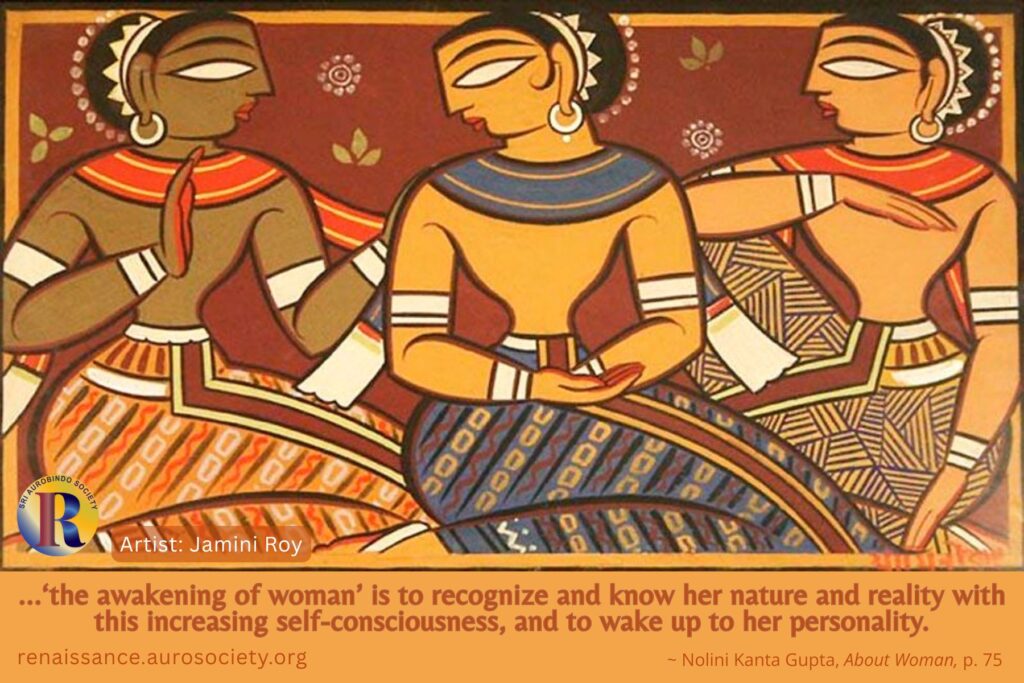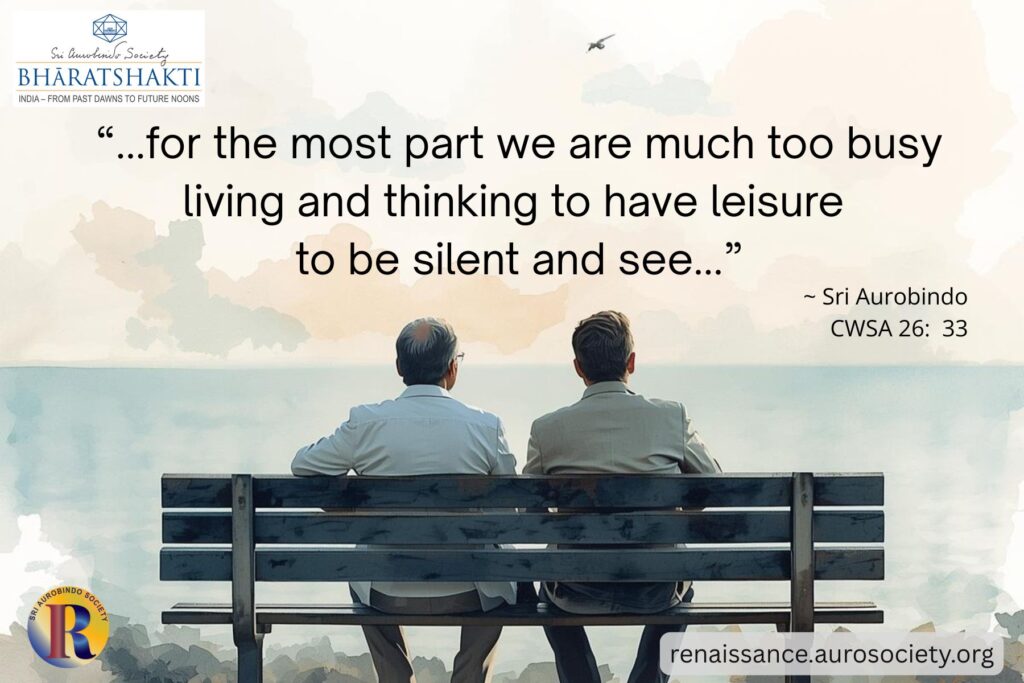Editor’s Note: We present here selected passages from Sri Aurobindo and the Mother which give us practical guidance on how to handle the sources of disharmony in human relations in daily life. These sources include narrowmindedness, dislike and fault-finding in others.

Widen Your Consciousness
The whole trouble comes from the fact that you cannot harmonise with someone unless he is in agreement with your own ideas and his opinion and way of doing things are in conformity with yours.
You must widen your consciousness and understand that everyone has his own law. It is necessary to find the ground of understanding and harmony in a happy combination of individual wills and not to try that all may be the same in an identical will and action.
***
One of the chief obstacles to the establishment of a progressive harmony is our eagerness to prove to an opponent that he is wrong and we are right.
***
Among human beings, the most widely spread disease is mental narrowness. They understand only what is in their own consciousness and cannot tolerate anything else.
***
For each problem there is a solution that can give satisfaction to everybody, but for finding this ideal solution each one must want it, instead of meeting the others with the will to enforce one’s own preference.
***
Enlarge your consciousness and aspire for the satisfaction of all.
***
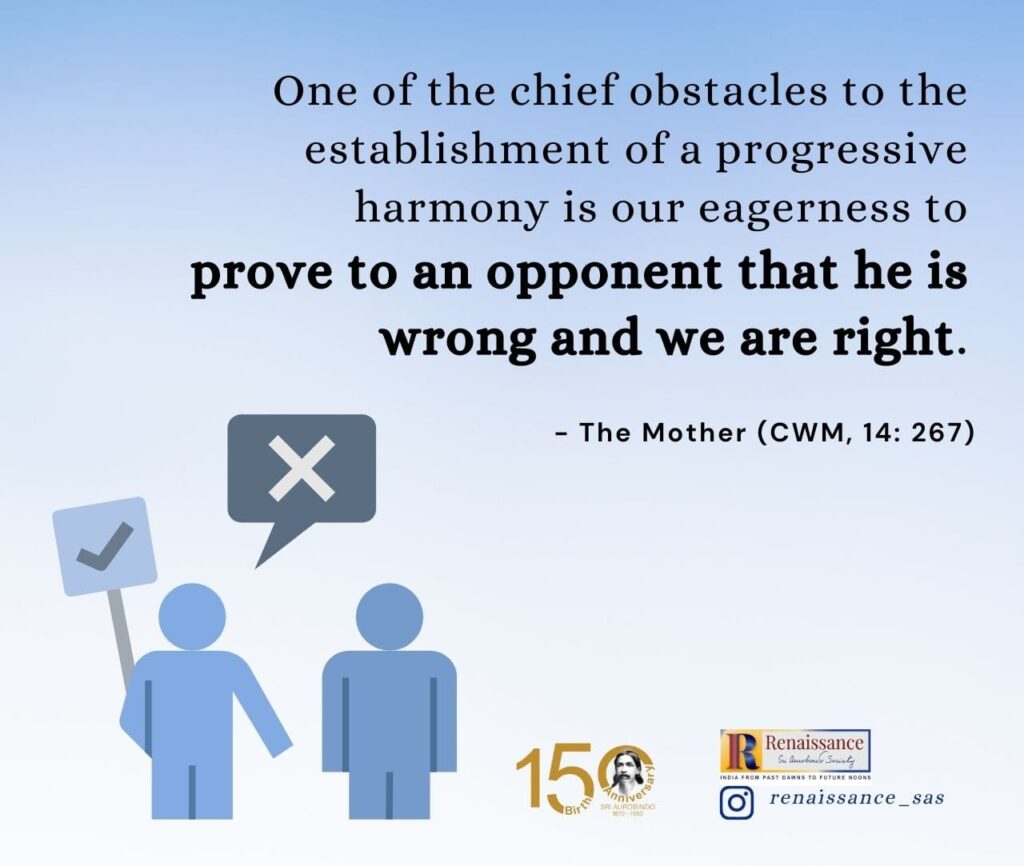
You see only your side of the question, but if you want to widen your consciousness it would be better to look from all sides impartially. Later you will discover that this attitude has great advantages.
***
As long as you are for some and against others, you are necessarily outside of the Truth.
– The Mother (CWM, Vol. 14, pp. 266-268)
Reject all Feelings of Dislike
Only those who sympathise can help—surely also one should be able to see the faults of others without hatred. Hatred injures both parties, it helps none.
***
It is this feeling of dislike that must have been the ground for the attack to come in. All feelings of dislike for other sadhaks should be absolutely rejected. Each has his own nature, his own difficulties and has to struggle out of them with the Divine Help. Defects and limitations in them should not be made a ground for dislike.
***
These things [reasons for disliking someone] are not sufficient to justify dislike. These dislikes come from some vital feeling and these reasons put forward by the mind are excuses, not the real cause.
This collaboration between the mind and the vital, the vital throwing up the wrong movement, the mind justifying it, is one of the chief difficulties in the way of getting rid of the vital deviations.
***
All antagonism to other sadhaks or dislike of them should go. There should be a calm goodwill and charity to all, but no inner mixing or interchange. Liking and disliking always means interchange of influences.
***
You can disapprove [of what people say], but there should be no feeling of dislike or disgust for the people. [. . .]
***
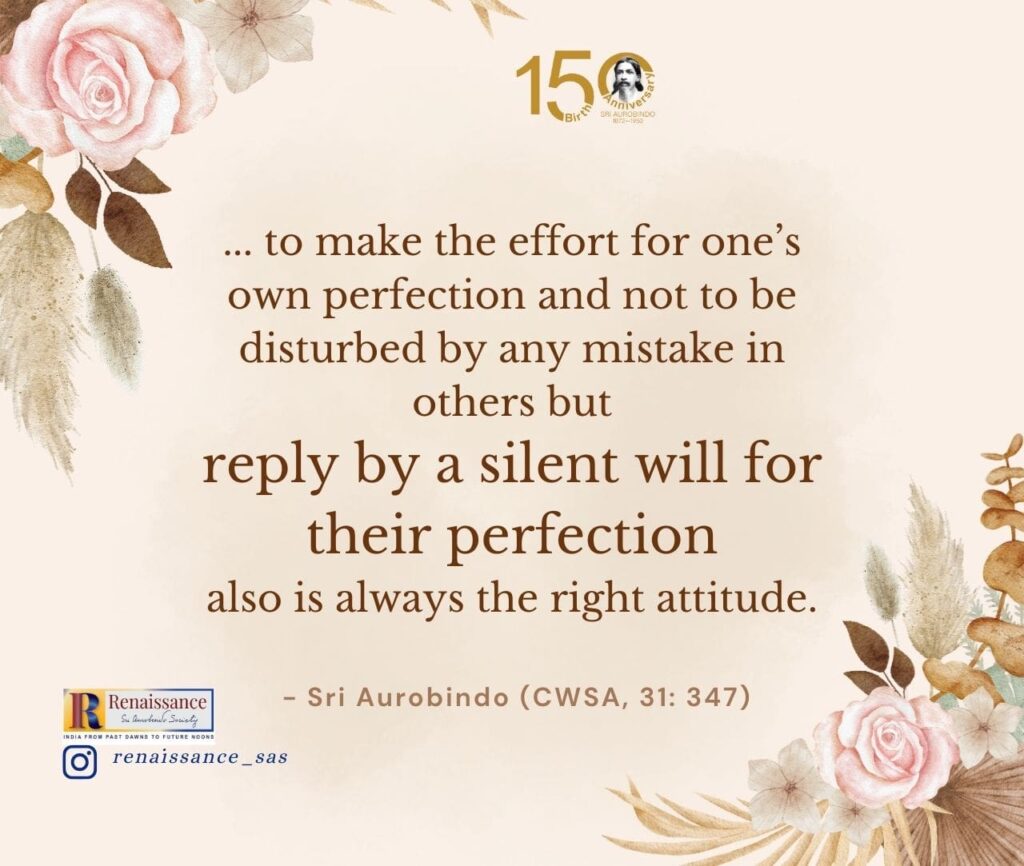
Read:
Friendship and Affection in the Path of Sadhana
Quarrels and Clashes Not Part of Sadhana
Quarrels and clashes are a proof of absence of the Yogic poise and those who seriously want to do Yoga must learn to grow out of these things.
It is easy enough not to clash when there is no cause for strife or dispute or quarrel; it is when there is cause and the other side is impossible and unreasonable that one gets the opportunity of rising above one’s vital nature.
***
Well, I have said already that quarrels, cuttings are not a part of sadhana; the clashes and friction that you speak of are, just as in the outside world, rubbings of the vital ego. Antagonisms, antipathies, dislikes, quarrellings can no more be proclaimed as part of sadhana than sex impulses or acts can be part of sadhana.
Harmony, goodwill, forbearance, equanimity are necessary ideals in the relation of sadhak with sadhak.
One is not bound to mix, but if one keeps to oneself, it should be for reasons of sadhana, not out of other motives,—moreover it should be without any sense of superiority or contempt for others.
. . .If somebody finds that association with another for any reason raises undesirable vital feelings in him or her, he or she can certainly withdraw from that association as a matter of prudence until he or she gets over the weakness.
But ostentation of avoidance, public cuttings etc. are not included in the necessity and betray feelings that equally ought to be overcome. There is a great confusion of thought about these things—for the vital gets in the way and disturbs the right view of things. It is only what is done sincerely with a sound spiritual motive that is proper to Yoga. The rest cannot be claimed as the working of a spiritual force mysteriously advancing its ends by ways contrary to its own nature.
***
Yes—self-justification [in a quarrel] keeps the thing going because it gives a mental support.
Self-justification is always a sign of ego and ignorance. When one has a wider consciousness, one knows that each one has his own way of looking at things and finds in that way his own justification, so that both parties in a quarrel believe themselves to be in the right.
It is only when one looks from above in a consciousness clear of ego that one sees all sides of a thing and also their real truth.
***
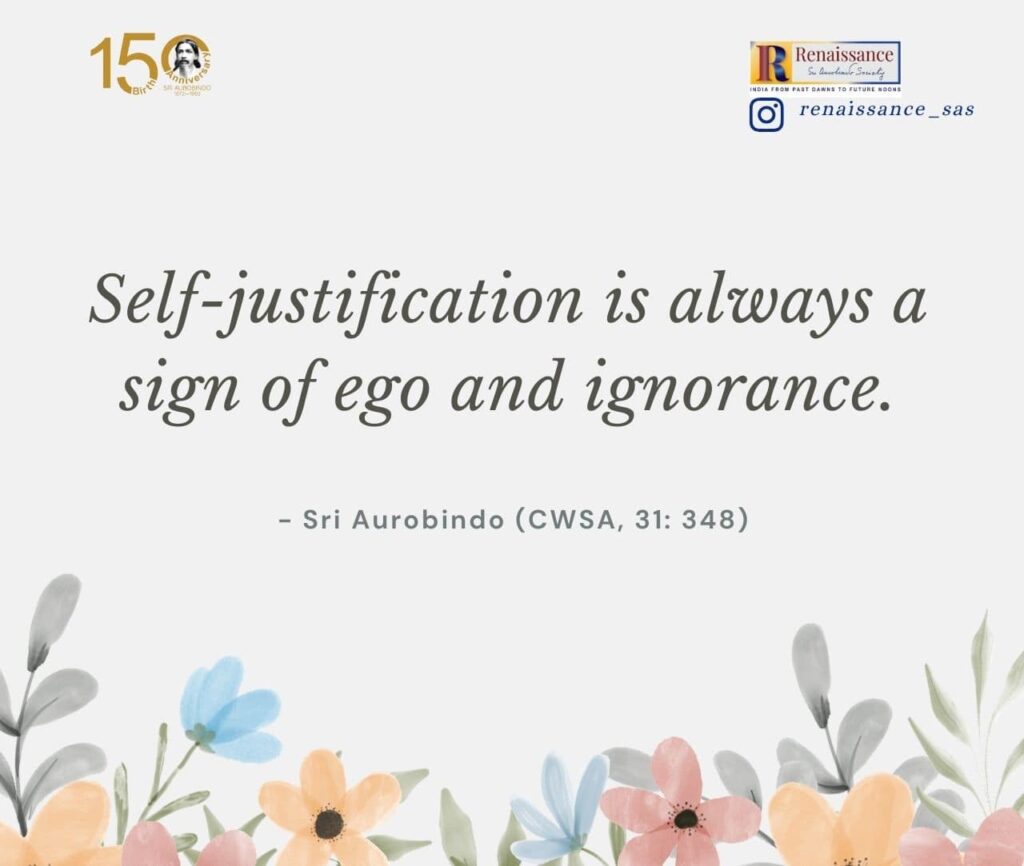
These results [unhappiness, dullness, obscurity] are not a punishment, they are a natural result of yielding to egoism. All quarrels proceed from egoism which pushes its own opinion and affirms its own importance, considering that it is right and everybody else wrong and thus creates anger and sense of injury etc. These things must not be indulged, but rejected at once.
***
[. . .]
Violence and blows are out of place in the Yoga. It is not by these means or by any physical or external impulsion or pressure that sadhana can be enforced but only by a psychic or other inner influence.
. . . self-control and self-mastery are necessary even in the ordinary life and still more necessary—quite indispensable—in Yoga.
***
[. . .] there is only one Power at work and neither Z nor Y nor anybody else matters. Let each one open himself to the working of that Power in him and let there be no attempt at forming a body of sadhakas with somebody leading or intervening between the one Power and the sadhakas. In that way there will be no room for rivalry or collision between opposing vital egoisms.
***
I am afraid that when vital passion disturbs the atmosphere, people very easily lose right perception and the sense of the thing that ought to be done, even those who are only or should be only onlookers. . .
For you, however, looking at it from your standpoint only, the best thing is not to brood on these things, but to turn away from the memory of them altogether; for brooding on them only prolongs the inner consequences of a mistaken, disturbing and painful movement. There is no need that you should apologise for anything; what we should advise is to bury the past episode and its mistakes and return to normal undisturbing relations.
Fix yourself more in an inner life and its opening to your soul’s future.
***
It is better not to involve oneself in the dispute and to leave the combatants to throw their brahmastras at each other, oneself safe in a calm and judicious indifference. It is also the attitude most helpful to the sadhana.
Of opinions and discussions there is no end and it is much better to remain inside and advance towards another light than the mind’s—though there is more fire of a smoky kind than light in these discussions.
***
It is not always possible in life and work to avoid friction and collision; but it can be minimised or deprived of its worst developments if one has a large understanding of the men around one with whom one has to deal and acts in that spirit.
If on the other hand one sticks to one’s own position, done without regard for the standpoint of others, that creates resistance and friction.
***
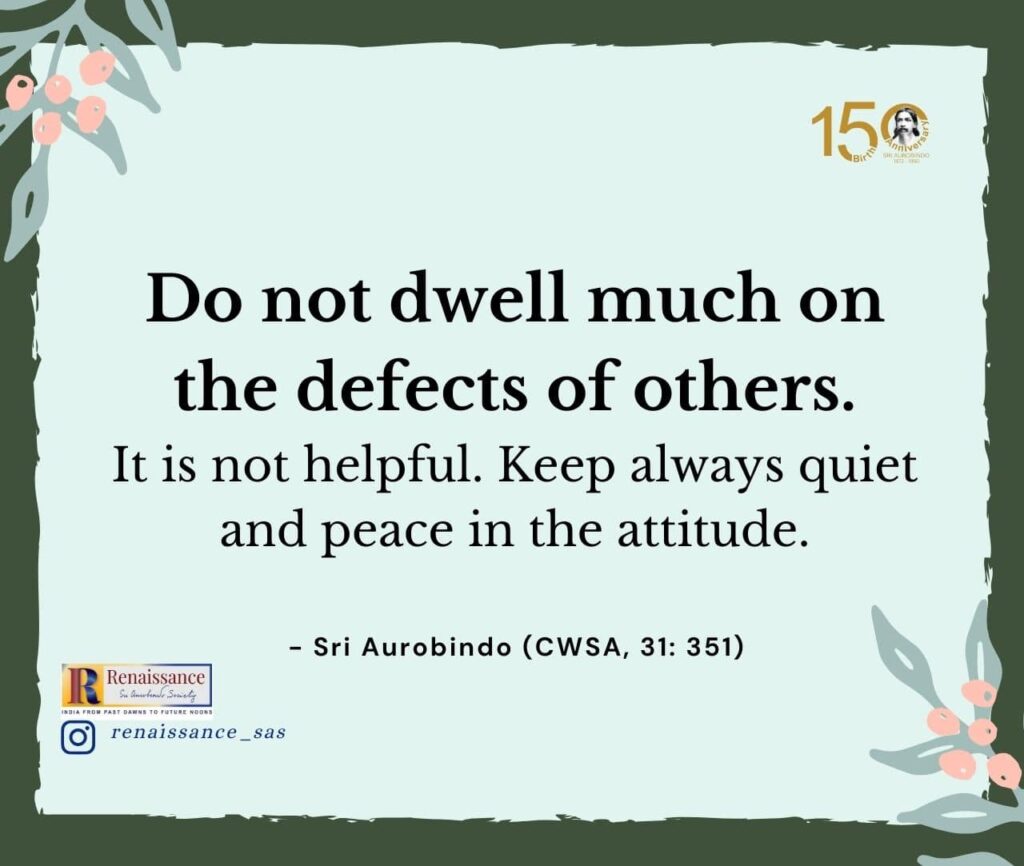
Fault-Finding and Criticism
There is no harm in seeing and observing [the behaviour of others] if it is done with sympathy and impartiality—it is the tendency unnecessarily to criticise, find fault, condemn others (often quite wrongly) which creates a bad atmosphere both for oneself and others.
And why this harshness and cocksure condemnation? Has not each man his own faults—why should he be so eager to find fault with others and condemn them? Sometimes one has to judge but it should not be done hastily or in a censorious spirit.
***
Men are always more able to criticise sharply the work of others and tell them how to do things or what not to do than skilful to avoid the same mistakes themselves. Often indeed one sees easily in others faults which are there in oneself but which one fails to see.
These and other defects such as the last you mention are common to human nature and few escape them. The human mind is not really conscious of itself—that is why in Yoga one has always to look and see what is in oneself and become more and more conscious.
***
In ordinary life people always judge wrongly because they judge by mental standards and generally by conventional standards. The human mind is an instrument not of truth but of ignorance and error.
***
It is the petty ego in each that likes to discover and talk about the (real or unreal) defects of others—and it does not matter whether they are real or unreal. The ego has no right to judge them, because it has not the right view or the right spirit. It is only the calm, disinterested, dispassionate, all-compassionate and all-loving Spirit that can judge and see rightly the strength and the weakness in each being.
***
. . . The lower vital takes a mean and petty pleasure in picking out the faults of others and thereby one hampers both one’s own progress and that of the subject of the criticism.
***
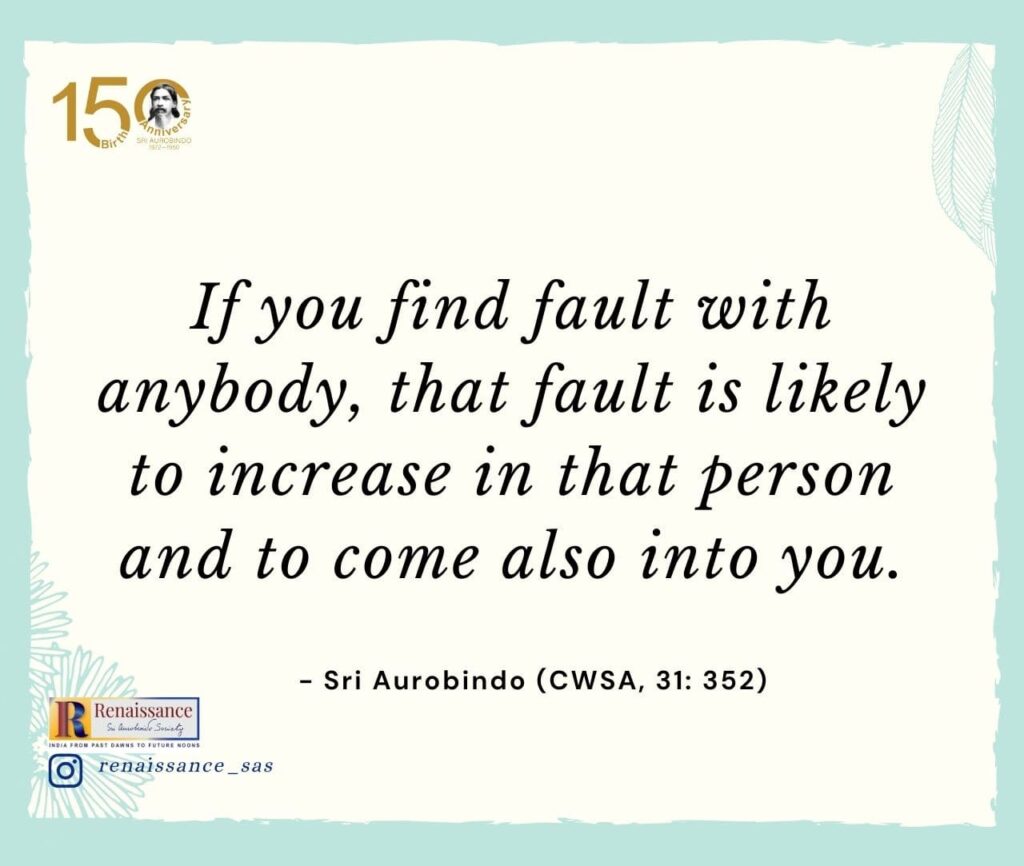
It is true that the habit of gossip and fault-finding with others does interfere because it brings down the consciousness from a higher to a lower level. But I do not think a retirement such as you propose is the way to cure it. It would only be suspended and the tendency come up again when you resumed free intercourse with others. It is on its field itself that it has to be first observed, then cured by detachment from it and rejection of it when it comes.
A partial retirement may sometimes be helpful for concentration,—but not for these things; there the only cure is what I suggest or else the descent of a higher consciousness to replace the present imperfect nature.
– Sri Aurobindo (CWSA, Vol. 31, pp. 346-352)
Read:
Relations between Men and Women in Integral Yoga
***
~ Design: Raamkumar

